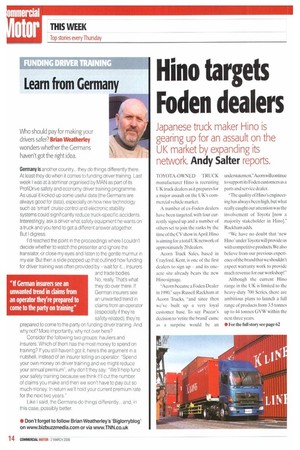Learn from Germany
Page 14

If you've noticed an error in this article please click here to report it so we can fix it.
Who should pay for making your drivers safer? Brian Weatherley wonders whether the Germans haven't got the right idea.
Germany is another country... they do things differently there. At least they do when it comes to funding driver training. Last week I was at a seminar organised by MAN as part of its ProfiDrive safety and economy driver training programme. As usual it kicked up some useful data (the Germans are always good for data), especially on how new technology such as 'smart' cruise control and electronic stability systems could significantly reduce truck-specific accidents. Interestingly, ask a driver what safety equipment he wants on a truck and you tend to get a different answer altogether. But I digress.
I'd reached the point in the proceedings where I couldn't decide whether to watch the presenter and ignore the translator, or close my eyes and listen to the gentle murmur in my ear. But then a slide popped up that outlined how funding for driver training was often provided by wait for it._ insurers and trade bodies.
No, really. That's what they do over there, If German insurers see an unwanted trend in claims from an operator (especially if they're safety-related), they're prepared to come to the party on funding driver training. And why not? More importantly, why not over here?
Consider the following two groups: hauliers and insurers. Which of them has the most money to spend on training? If you still haven't got it, here's the argument in a nutshell. Instead of an Insurer telling an operator: "Spend your own money on driver training and we might reduce your annual premium", why don't they say: "We'll help fund your safety training because we think it'll cut the number of claims you make and then we won't have to pay out so much money. In return we'll hold your current premium rate for the next two years."
Like I said, the Germans do things differently.., and, in this case, possibly better.
















































































































































































































